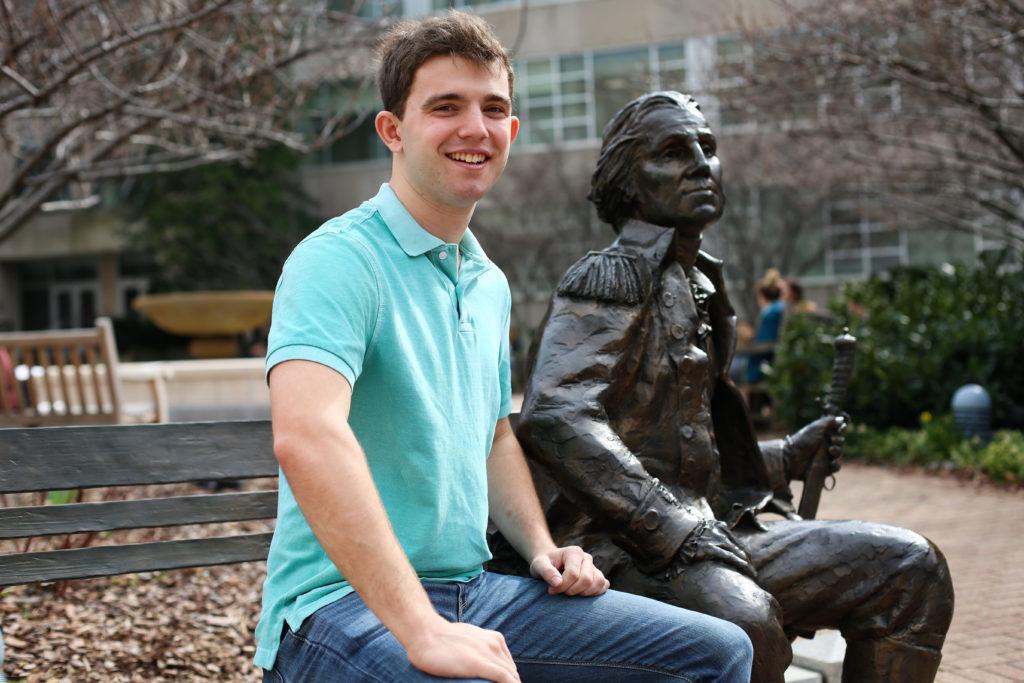Updated: March 5, 2017 at 11:24 p.m.
The director of campus operations for the Student Association announced his candidacy for the SA’s top post Monday.
Junior Cole Ettingoff’s plans include creating a streamlined complaint system for students, faculty and staff about academic and administrative issues and renovating Thurston Hall. He said he will also start a “Vern by choice” housing policy and open a 24/7 student center.
“I have been hearing that students leave here not feeling like they had a home at GW, like this University did not really care about them, and it’s sad,” Ettingoff said. “I think the SA can really do more to help support our students.”
Ettingoff said he will create a system for all departments on campus where students can submit complaints about things like conflicts with professors, slow lines at package services, international students not getting their paperwork processed quickly and faculty in residence conduct, he said.
I think the SA can really do more to help support our students.
“Right now if I google ‘GW complaints,’ it will show me the complaints office with a dozen different places I could go to file a complaint on different issues. It is too complicated,” he said. “I think the SA president can’t do it alone, but there needs to be a vocal leader.”
Ettingoff said the system would function like a Google Form, where students would send in complaints via a website. Complaints would be reviewed by a board for the department made up of about two faculty members, two staff members and students.
Various departments have their own grievance systems to address complaints, according to the Division of Student Affairs.
He added that he has talked to administrators like Alicia Knight, the senior vice president operations, and Seth Weinshel, the director of housing, about the feasibility of streamlining communication between departments.
Ettingoff said he also plans to meet with Weinshel this week to discuss potential Thurston Hall renovations that he hopes can happen within the next five years. He said he plans to get a renovation proposal on the agenda for the February 2018 Board of Trustees meeting.
“The Board of Trustees members who are engaged with the students expect that this will happen at some time, and it cannot be put off any longer,” Ettingoff said.
Ettingoff said construction on Thurston could be funded by the University issuing bonds and paying them off over time, similar to loans. GW has used bonds to fund construction on other buildings on campus in the past, like Amsterdam and Shenkman halls.
Instead of closing down the entire residence hall, Ettingoff said he proposes closing two floors each semester that could be filled as soon as they are completed with students from the next floors being displaced.
He said he will also work to increase the number of off-campus living exemptions while maintaining the three-year on-campus housing requirement. Exemptions are currently allowed for disabled students, commuters and students with religious beliefs that cannot be accommodated in residence halls, according to the GW Housing website. Third-year students can also enter a lottery for an exemption from the mandate.
University officials have cited issues like housing incoming students at Colonial Inauguration in the summer and the approximately 1,100 students who live in the building during the year – more than any other residence hall – as reasons to stall the building’s renovation.
He said he has already spoken to several administrators like John Ralls, the special adviser for communications and outreach, about the renovations, though he did specify what they discussed.
Ettingoff said he would also make living on the Mount Vernon Campus optional and would add two or three student communities and affinities to the campus to encourage more students to live there, like the Global Connections Living Community currently housed in Amsterdam Hall. The campus is already home to academic groups, including the Women’s Leadership and the University Honors programs, although housing there is voluntary for honors students.
I want the Vern beds to be filled with people who want to live there over people who were just placed there.
Ettingoff said he will rely on student input and the housing office to determine which affinities will be moved. He said will talk to Weinshel about increasing the number of living communities on the Mount Vernon Campus to fill all of the beds on the campus.
“I want the Vern beds to be filled with people who want to live there over people who were just placed there,” he said.
The Vern currently has 612 beds for freshmen and 68 for upperclassmen, according to the housing website.
Ettingoff said he would make the SA resource center, located on the fourth floor of the Marvin Center, open 24/7 to accommodate students’ schedules. He said he is open to exploring alternate locations because the Marvin Center itself is not open 24 hours. Gelman Library is the only campus building that is regularly open to students 24/7.
The current center opened this fall to reduce the amount of money and time student groups spend buying and distributing common supplies. Ettingoff said he would stock the center with camera equipment.
He said he plans to staff the revamped center with SA office staff, students who apply through GWork or have it be open but unmanned but accessible with tap access. Ettingoff said he did not know how much staffing the center would cost and declined to say who at GW he has spoken with about the feasibility making the center open 24 hours.
“It’s something that the SA can manage and house. It is something where the SA needs to ask what can we do to help our fellow students,” he said.
This post was updated to reflect the following correction:
Due to a misstatement by Ettingoff, The Hatchet incorrectly reported that he had talked to Weinshel about a “Vern by choice” policy. He has not talked with Weinshel about it.





